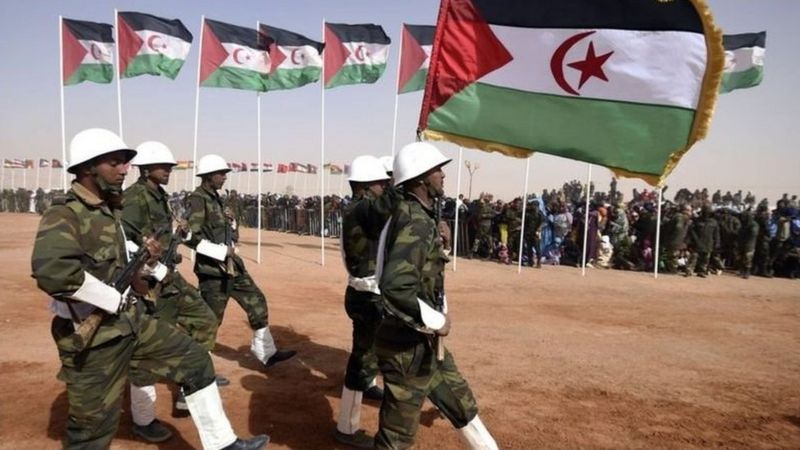On Saturday, the Saharawi people will commemorate the 50th anniversary of the outbreak of the armed struggle, that pivotal station in their struggle that demonstrated the strength of resistance and steadfastness in order to recover their lands from the Spanish colonizer and then from the Moroccan usurper.
The continent’s longest conflict
The conflict actually began in 1975, when Spain, before its evacuation from Western Sahara, signed the Madrid Agreement with Morocco and Mauritania, according to which the two neighboring countries shared the Sahara, but the Sahrawis, who founded the Polisario Front, rejected the agreement and continued their demands for secession. The Front stepped up the pace of its movements and organized several demonstrations calling for independence, while Morocco and Mauritania turned to the International Court of Justice.
After nearly three decades of patience and betting on the UN-African peace plan to decolonize the last colony in Africa, the events of Karkarat (when the Moroccan occupation forces assaulted unarmed Sahrawi civilian demonstrators in the buffer zone) constituted a turning point in the position of the Sahrawis, who have always prevailed over peace. Weapons, as the Polisario Front decided to resume the war to protect its people from the brutal aggression of the occupier and to continue its armed struggle until the recovery of all occupied lands.
The outbreak of the armed struggle on May 20, 1973 constituted a turning point in the history of the Sahrawi people, which reflected their attachment to their just cause and their strong belief in it, and signaled their break with a period of colonial domination, as they took up arms to oppose the intruder occupation on their lands, to become a model of liberation among the liberation movements. The yearning for emancipation from colonialism across the world.
The Polisario is not just a liberation movement
The name Polisario refers to the initials of the “Popular Front for the Liberation of Saguia El Hamra and the Valley of Gold” in Spanish. It was founded on May 20, 1973 with the aim of establishing an independent state in Western Sahara.
Then it fought an armed conflict, with both Morocco and Mauritania, regarding the independence of the region, but Mauritania, for its part, withdrew from southern Western Sahara, leaving Morocco with its ambitions as an intruder usurper.
In the face of the persistence of the Moroccan occupation in its conspiracies to perpetuate its expansionist ambitions, and to impose a fait accompli in Western Sahara, and in light of the international community’s failure regarding the aspirations of the Sahrawi people in their right to self-determination. It is matched by the strength, determination and faith of this proud people. Between 1975 and 1976, the Front announced the establishment of “ The Sahrawi Arab Democratic Republic,” and formed a government in the far south of Algeria. As of 2018, 84 member states of the United Nations have recognized the Republic of Western Sahara. As for the countries that abstained, they recognize the Polisario Front as the legitimate representative of the population of Western Sahara.
Despite the adoption of several United Nations resolutions calling for the empowerment of the Sahrawi people of this right, the process of decolonization of Western Sahara has not yet taken place due to Morocco’s obstruction and rejection of all international efforts aimed at reaching a peaceful and lasting settlement to the conflict.
The Sahrawi people are counting on the front that seeks to liberate Western Sahara, defend the rights of the people and educate the world on the legitimacy of the cause.
Peaceful people and a painful reality
The Western Sahara crisis is considered one of the longest political and humanitarian conflicts in the world. During this war, many Sahrawis sought refuge in Algeria, where they have been living in camps for decades.
Estimation of their number varies, as the UNHCR website attributed to Algeria, saying that there are 165,000 Sahrawi refugees in the five camps near Tindouf.
United Nations agencies indicate that these refugees live under difficult conditions, while the Sahrawi people live in catastrophic conditions, to say the least, despite their country’s rich fishing areas and phosphate reserves, and it is also home to oil reserves, which is the reason for the insistence of Morocco to continue the occupation.
The reason for Algeria’s support for Western Sahara
As for the reason for Algeria’s support for Western Sahara, it is a matter of principle, like its support for Nelson Mandela in South Africa, and its support for the Palestinian cause and all just causes around the world. Especially in the face of the suffering of the Sahrawi people, who were deprived of the resources of their country, they are matched by the strength and determination of the Sahrawi people with their cause and their belief in a breakthrough one day. As for the relationship between Algeria and Western Sahara, it will remain historical until the Sahrawi people achieve their right to self-determination.
It is noteworthy that the Algerian diplomacy plays an active role among the countries of the world. It made the Organization of African Unity recognize the Sahrawi government as a member, and that prompted Morocco to withdraw from this organization.
Algeria continues its proactive activities in various forms, internationally and continentally, to enable the Sahrawi people to obtain their rights and demands.
For reference, the Sahrawi Arab Democratic Republic football team was officially established in Algeria, on Thursday, in the presence of the Ambassador of Western Sahara to Algeria Abdelkader Taleb Omar, and officials in the lecture hall of the “5 July 1962” stadium.
The Western Sahara football team will play a friendly match with Mouloudia Algiers, and its phases will be hosted by the “Nelson Mandela” stadium in Baraki tomorrow, Saturday.
#founding #Polisario #Front #outbreak #armed #struggle #Western #Sahara #commemorates #Algerian #Hewar
#oussama_boulegheb #elhiwardz #alakhibariat.xyz #elhiwar #elhiwar-en



